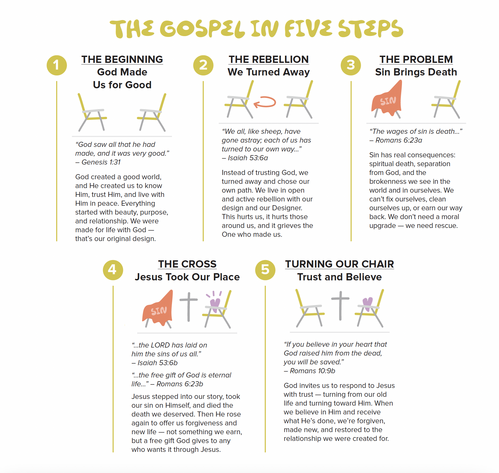For those I haven’t yet had
the chance to meet, my
name is Drew! I have the
honor and privilege of serving
as Bay Area’s first-ever Local
Missions Pastor. A little about
me: I grew up in the Midwest
surrounded by cornfields and
cows. My relationship with Jesus
was cultivated thanks to my
mentor, Ray VanderLaan. A trip
to Israel with him led me to study
Bible at Hope College, hoping
to move overseas as a full-time
missionary. Later, I moved to
Charm City for graduate school
to pursue my “visa skill,” public
health. While finishing that
program, Jesus clearly called me
here — to the local church and
to be a missionary to my own
culture. Proverbs 16:9 says, “The
heart of man plans his way, but
the LORD establishes his steps.”
My life is living proof of that.
To date, one of my favorite projects I’ve been able to work on was the Good News series I partnered with Aaron and Greg to create. In this series, we looked honestly at our world. It is obviously broken — pain, injustice, and division are everywhere. These are SYMPTOMS that something deeper is wrong. And if we only treat the symptoms, we won’t get better; we might get worse. The underlying SICKNESS is sin. We “miss the mark,” choosing to define good on our own terms. Humanity has rebelled against God. The SOLUTION to this sickness is found in the birth, life, and death of Jesus, who enters our world, takes on our sin as fully God and fully human, and offers the healing and restoration we can’t produce on our own. The PROOF that this solution is real is the resurrection — Jesus predicting and then pulling off His own resurrection validates everything He said and did, showing His authority over sin and death. It proves He is who He claims to be. Our RESPONSE is to trust Jesus, turn toward Him, and live the life He leads. Put together, these five movements form a clear logic: a broken world points to a deeper sickness, which requires a divine solution proven by the resurrection, and invites our personal response.
At the core of the series is the image of two chairs. They represent a conversation and a relationship. It’s a simple, triedand- true way to share what Jesus has done for us.
To date, one of my favorite projects I’ve been able to work on was the Good News series I partnered with Aaron and Greg to create. In this series, we looked honestly at our world. It is obviously broken — pain, injustice, and division are everywhere. These are SYMPTOMS that something deeper is wrong. And if we only treat the symptoms, we won’t get better; we might get worse. The underlying SICKNESS is sin. We “miss the mark,” choosing to define good on our own terms. Humanity has rebelled against God. The SOLUTION to this sickness is found in the birth, life, and death of Jesus, who enters our world, takes on our sin as fully God and fully human, and offers the healing and restoration we can’t produce on our own. The PROOF that this solution is real is the resurrection — Jesus predicting and then pulling off His own resurrection validates everything He said and did, showing His authority over sin and death. It proves He is who He claims to be. Our RESPONSE is to trust Jesus, turn toward Him, and live the life He leads. Put together, these five movements form a clear logic: a broken world points to a deeper sickness, which requires a divine solution proven by the resurrection, and invites our personal response.
At the core of the series is the image of two chairs. They represent a conversation and a relationship. It’s a simple, triedand- true way to share what Jesus has done for us.

A gospel tool is well and good, but you might be wondering, What does this have to do with me? I’m not gifted as an evangelist. Well, this year we are focusing as a church on becoming “Good News People.” Whether we acknowledge it or not, we carry good news into a world full of bad news. We want to be the kind of people who show and share the Good News of Jesus so that others might truly live. We want to join Jesus on His mission where we live, work, play, and learn. In other words, we are becoming more like Jesus and helping others do the same. Sharing the Good News isn’t just for experts and extroverts. It’s for everyday people like you and me — ordinary people with an extraordinary HOPE.
So what does it look like to do this? The first and most important step in this journey is prayer. Prayer is the most powerful tool we have. So join us. Let’s pray by name for people who don’t yet know Jesus.
To help with this, we’ve created a Prayer Bookmark. On it, you’ll find a spot to write seven names — one for each day of the week — of people in your life who don’t yet know Jesus. If you haven’t gotten one yet, you can find them on Sundays at the kiosk just outside the Auditorium doors.
So what does it look like to do this? The first and most important step in this journey is prayer. Prayer is the most powerful tool we have. So join us. Let’s pray by name for people who don’t yet know Jesus.
To help with this, we’ve created a Prayer Bookmark. On it, you’ll find a spot to write seven names — one for each day of the week — of people in your life who don’t yet know Jesus. If you haven’t gotten one yet, you can find them on Sundays at the kiosk just outside the Auditorium doors.
